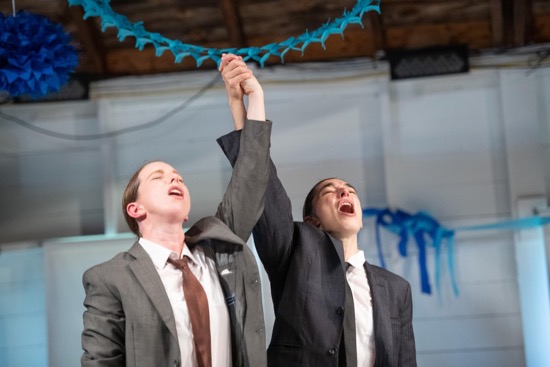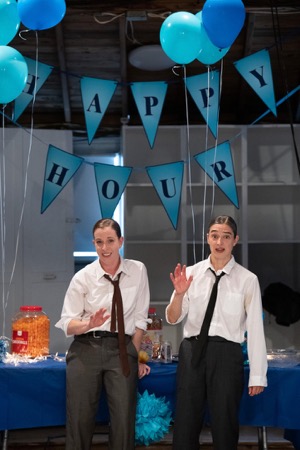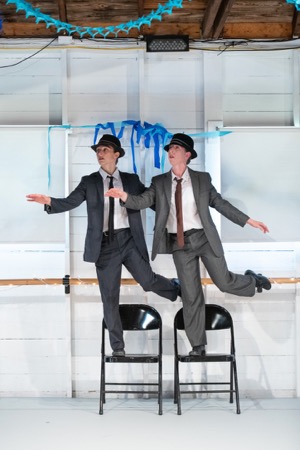Monica Bill Barnes and Anna Bass perform Happy Hour at Jacob’s Pillow, 7/26-28 and 8/2-4.

Anna Bass (L) and Monica Bill Barnes celebrate happy hour. Photo: Christopher Duggan
The first time I saw Monica Bill Barnes’s Happy Hour, it took place in a long, narrow studio at Gibney Dance, 280 Broadway. In that re-purposed old building near City Hall, it was easy to imagine Barnes and Anna Bass—clad in hats, suits, and ties, their hair slicked back into puny buns—coming from another room. In the one-story, wooden, white-painted Sommers Studio at Jacob’s Pillow, they seem to have blown in to escape just such a conference and ended up in an off-beat Eden that’s too good to be true.
We spectators arrived early for a performance that’s due to start at 5:00 P.M. And while we wait outside on the lawn for the door to open, the idea of joining an office party becomes more and more alluring. The door opens. Whoa! Crepe paper garlands, bunches of blue balloons, banners, colored lights, and a table bearing beer cans, wine bottles, pretzel sticks, cheese balls. Help yourselves. Host Robbie Saenz de Viteri is pouring old-fashioneds at a miniature sort-of-lectern on wheels and (oops, he almost forgot) microwaving popcorn.
He’s diligently, engagingly, and a bit wackily on the job. He collects our calling cards or scribbled bits of paper; the person whose name is drawn will win a $25 ticket to a Pillow event. He chats us up, finds two women in the audience who are turning 84 this very day, and gets us singing to them (managing to wedge “dear-Glenna-and-Carmen” into the tune is difficult, but we do it).
Saenz is very good at jostling us into camaraderie. Before long, two people in front of me are turning to talk with two in my row, having just discovered that they all hail from North Carolina. The woman sitting next to me starts chatting with me, as we sip and munch. We all join in singing “Sweet Caroline” and, lo, the words appear on a puny video screen.

Anna Bass (L) and Monica Bill Barnes relax (?) by the snack table. Photo: Christopher Duggan
At 5:30, Barnes and Bass walk in the door—Barnes surreptitiously eyeing the drinks and snacks, both of them checking us out, but also doffing their hats and giving little nods and jerks to acclimate to the music that starts playing. Needing courage, Bass takes a quick slug from a flask she produces; Barnes declines.
As in almost every work of Barnes’s that I’ve seen, the performers skillfully re-invent themselves as people who are subtly awkward and ill at ease in almost every situation they’ve wandered into. In Happy Hour, she and Bass often need to retreat to the back of the space and whisper to each other; they shoot worried glances and silent queries at us. Do we get it? Will we like them? Did they meet us earlier?” When they speak (rarely), they have little-girly voices, and Barnes is insecure as to pitch when she gamely sings.

Monica Bill Barnes (L) and Anna Bass synchronize their moves in Happy Hour. Photo: Christopher Duggan
However, the two intermittently dance to beat the band—always side by side and in unison. The first time, they need to prove to us that they’re really tough. They make fierce faces; their fists hit the air; they stomp, whirl, clap, and check our responses. When we applaud, they retreat for another consultation and return to show off their time-step, while recorded Elvis Presley sings “Love Me Tender.” Bass falls down. Barnes produces a wan bouquet of red flowers to cheer her up, and it does, I mean, really does. Now she gets us to cheer for her helper: “Mo-ni-ca!!” And now they’re ready to dance again—jackets off, sleeves rolled up—facing us and running in place.
What would a party like this be without a surprise honoree? Barnes and Bass make much of a woman they choose from the audience (ousting the guy sitting in from of me so they can borrow his chair for her), seat center stage, and dance for her. She applauds them, her little claps sounding forlorn in the silence before we join. There’s more to this scenario, and it probably differs slightly from one performance to the next. Suffice it to say that Bass takes the woman out the door for while, leaving Barnes even more insecure.

Anna Bass triumphs. Monica Bill Barnes applauds. Photo: Christopher Duggan
These two are skilled comedians; the twitch of a mouth, the lift of an eyebrow, the hunted look that flashes briefly over their faces are all elegantly timed and delivered. They throw themselves into dance routines in an attempt to ingratiate themselves with us (and we love them for it). These numbers match the rhythms of such hits as Judy Garland singing Harold Arlen and Johnny Mercer’s “Come Rain or Come Shine,” Journey pushing into “Any Way You Want It,” Nat King Cole’s velvet voice delivering “(I Love You) For Sentimental Reasons.” Ten songs in all. The choreographed sequences—stand-ins for conversation—become become more intricate and (dare I say it?) more virtuosic as the party progresses. What the hell, the guys must be thinking. Why not cut loose a little? We strike them as friendly. Maybe they fit in after all. When the evening is almost over, the aria “O Silver Moon” from Antonin Dvorák’s opera Rusalka sends them dancing into dreamed-of heights.
Then lighting designer Jane Cox turns the studio pink, and we can all take a slice from a birthday cake that has “Glenna” and “Carmen” written on it in icing.

Thanks Deborah, nice writing, I’ve never seen them, now feel that at least a little bit, I have.